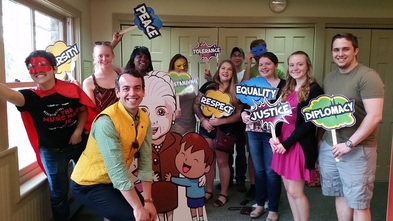 Where quotas have failed, maybe belonging can succeed. According to an August, 2016 Harvard Business Review article, diversity doesn’t work if various groups don’t feel – deep down in their bones– like they matter. In other words, success equals a stake because members feel like they belong to a team, an organization or a professional mission. [See the full article by Pat Wadors at https://hbr.org/2016/08/diversity-efforts-fall-short-unless-employees-feel-that-they-belong.) When we get to know one another we can begin to better understand each other. And if we understand each other better, our work efforts become more satisfying and our productivity rises, too. This past spring a core group of Delaware Valley University students received an education on cultural diversity though a joint pilot program with Pearl S. Buck International in Hilltown Township. The three-part series of workshops, some of which were held at the late Pulitzer and Nobel Prize winner’s rural estate, aimed to create dialog and understanding about the value of cultural diversity. The idea was to make participants think. “Students were able to identify a space within themselves by learning about Pearl S. Buck’s leadership” said Andrew Moyer. Moyer is assistant dean of students and director of student involvement at DelVal. Moyer said he believed that learning about Buck’s commitment and legacy could influence future leaders. Laura Lomax, director of programs for Pearl S. Buck International, said intercultural competency was vital to successful business endeavors, and to making an enriching life experience. Lomax said the top three attributes most businesses look for when recruiting and hiring new employees are curiosity, empathy and self-awareness. Lomax said those who were more culturally sensitive navigate the workforce more easily, and a more culturally mixed team brings fresh ideas and perspectives to the table. “Greater attention, improved talent and enhanced creativity” are byproducts of a mixed cultural dynamic, Lomax said. “We believe it is really important for people to develop skills to navigate cultures effectively,” she added. During the workshops, students were given surveys to help determine their cultural literacy and intercultural competencies. “The assessment measured where they might fall on the scale. How culturally sensitive they were, and from where they could move to a more culturally sensitive place,” Lomax said. Undergraduate students were selected from most grade levels according to their demonstrated leadership skills and abilities. Taking advantage of better understanding and seeking opportunities to learn about the world surrounding them would also lead to success in all realms, Moyer said. “This (intercultural competency) is a lifelong journey,” Lomax said. Comments are closed.
|
Archives
November 2022
Categories |
| Upper Bucks Chamber of Commerce | ubcc BLOG |
|
Copyright Upper Bucks Chamber of Commerce. All Rights Reserved.
21 N. Main Street | Quakertown, PA 18951 phone: 215.536.3211 | fax: 215.536.7767 | [email protected] | sitemap |
 RSS Feed
RSS Feed
